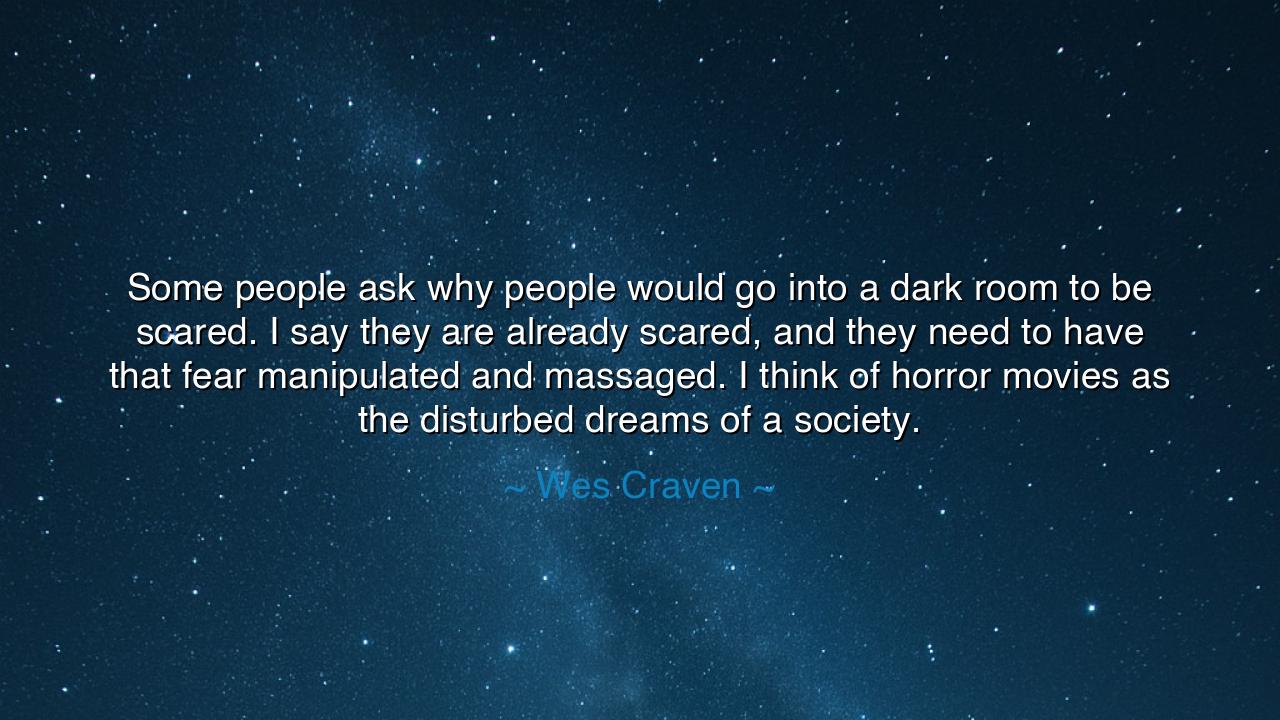
Some people ask why people would go into a dark room to be
Some people ask why people would go into a dark room to be scared. I say they are already scared, and they need to have that fear manipulated and massaged. I think of horror movies as the disturbed dreams of a society.






“Some people ask why people would go into a dark room to be scared. I say they are already scared, and they need to have that fear manipulated and massaged. I think of horror movies as the disturbed dreams of a society.” Thus spoke Wes Craven, master of shadows and dreams, the conjurer of nightmares who understood that terror itself can be a mirror. His words pierce beyond the flickering screen — they speak of human fear, the secret pulse that beats beneath every civilization. In his insight lies the revelation that we do not watch horror to feel fear, but to understand it, to tame it, to give shape to what already lurks within us. Fear, he tells us, is not the enemy — it is the truth unspoken, the darkness we carry in silence.
Craven’s quote was born not from theory, but from his life’s art — from decades of exploring the haunted landscape of the human psyche. As a filmmaker, he crafted tales that frightened millions, yet those who looked deeper saw not monsters of the supernatural, but reflections of society’s hidden wounds. In "A Nightmare on Elm Street", the monster Freddy Krueger was not just a villain — he was the embodiment of guilt, repression, and the sins of parents visited upon their children. In "Scream", he exposed not ghosts but the violence of culture itself, mocking and revealing our fascination with fear. When Craven spoke of horror as “the disturbed dreams of a society,” he meant that what we see in the darkened theater is not fantasy, but collective confession — the unvoiced anxieties of an age.
To understand this truth, we must look back to the ancient storytellers, who too understood the sacred role of fear. The Greeks told of Medusa, whose face turned men to stone — a symbol not of evil, but of the paralyzing gaze of truth. The Egyptians spoke of the weighing of the heart, where the dead trembled before their own deeds. Fear has always been the language through which societies confront the unknown and the unspoken — death, guilt, the fragility of order. Wes Craven was heir to that ancient tradition; he simply traded the fire-lit circle for the glow of the cinema screen. He knew that to face our nightmares in fiction is to prepare the soul to face them in life.
When Craven says that people “are already scared,” he speaks of a deeper condition — the anxiety of existence itself. In every age, humanity walks beneath invisible weights: war, injustice, isolation, change. We go into the darkened room, he says, not to create fear, but to release it, to see it given form and then defeated, if only for a moment. Horror, then, is not despair — it is catharsis. It is ritualized terror, a controlled storm that purifies the mind. As the ancient Greeks had their tragedies to cleanse the emotions, so modern audiences have horror to cleanse the collective heart.
Consider the story of Mary Shelley, who wrote Frankenstein in the year without summer, when the skies were dimmed by volcanic ash and the world itself seemed dying. Out of that darkness came her tale of a man who created life and met destruction — a parable not of science, but of human hubris and loneliness. Her monster was the shadow of her century, the fear of progress without compassion. So too are Craven’s monsters the children of his time — born of social unrest, moral decay, and technological alienation. Each age, he reminds us, dreams its own nightmares, and from those dreams, we can read the state of its soul.
In his wisdom, Craven teaches that fear must not be denied, but transformed. The one who flees from his fear becomes its slave, but the one who names it gains power. Horror allows the collective to speak the unspeakable — to look at death, cruelty, and madness, and through art, to wrest meaning from them. It is not the scream that destroys us, but the silence that hides beneath it. To “manipulate and massage” fear, as Craven says, is to give it structure — to turn chaos into story, panic into revelation. In this, horror becomes not an indulgence of darkness, but a ritual of renewal.
Therefore, O seeker of wisdom, take this lesson into your heart: do not fear fear itself, but learn from it. When the world grows dark, step into the theater of your mind and watch what your spirit reveals. Ask what monsters dwell within your age — the greed, the hatred, the despair — and confront them with the courage of awareness. Create, speak, or reflect, but do not look away. For only through the shadow do we rediscover the light.
Wes Craven’s words endure because they remind us that horror is not about death, but about life’s hunger to understand itself. Every society dreams, and every dream carries its darkness — but in facing it, we awaken. And so, the next time you enter that dark room, remember: you do not go there to be frightened, but to be freed. For the disturbed dreams of society, when faced with courage, can become the dawn of its awakening.






AAdministratorAdministrator
Welcome, honored guests. Please leave a comment, we will respond soon